In summer 2020, we launched a 1st Annual $5,000+ Diversity Scholarship with the support of generous donors, inviting minority equestrians to contribute to the discussion of diversity and inclusion in equestrian sport. It is the mission of this annual bursary, which we intend to expand in coming years, to call for, encourage, elevate and give a platform to minority voices in a space where they are underrepresented.
How do we build a more diverse, inclusive and accessible sport? In the coming weeks, we will explore this question alongside many of the 27 Scholarship recipients as they share with us their essays in full. Collectively, their perspectives coalesce into a body of work that will no doubt help inform a viable path forward for equestrian sport, and we are committed to connecting their actionable ideas with the public as well as leaders and stakeholders of the sport.
Today we welcome Muhammad Shahroze Rehman. More voices: Dana Bivens | Leilani Jackson | Julie Upshur | Aki Joy Maruyama | Jen Spencer | Jordyn Hale | Dawn Edgerton-Cameron | Madison Buening | Caden Barrera | Deonte Sewell | Anastasia Curwood
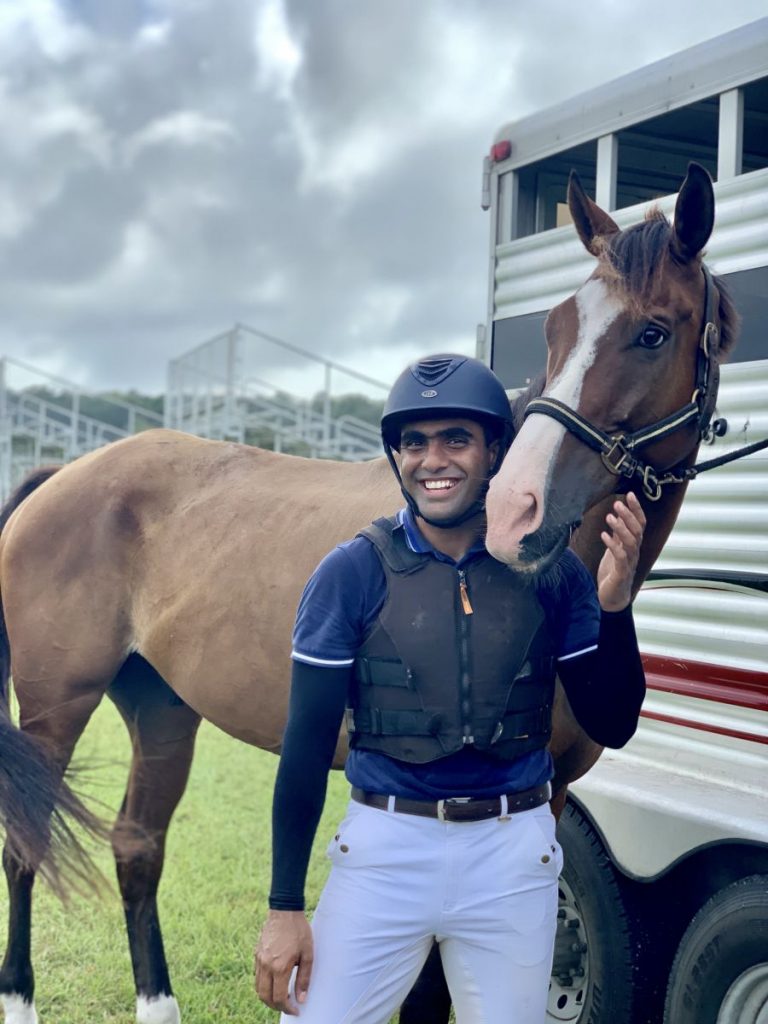 Photo courtesy Muhammad Shahroze Rehman.
Photo courtesy Muhammad Shahroze Rehman.
I was 11 years old when I first sat on horseback, I vividly remember every moment of it, the excitement, the passion, it was the most amazing feeling of this world. Hi! I am Muhammad; I love horses and I will give up anything in my life for my passion for horses and equestrian sports.
I am a Fulbright Scholar from Pakistan, currently pursuing my PhD in Educational Technology and Human-Centric Computing at the University of Florida. Over the past two years, I have worked with students with disabilities to study the accessibility and usability of online learning for all learners. My current research focus is on the applications of Virtual Reality (VR) in pedagogy for adult learners. I also teach a course on Introduction to Educational technology to undergraduates at the University of Florida. But this is not all that defines me.
I would define myself as a resilient individual chasing his dreams. Coming from a middle-class family of an underprivileged area of Pakistan, I was lucky to get into one of the most sought after and prestigious boarding schools in Pakistan. I was not a very social kid and talking to humans was not one of my strongest pursuits. As I was struggling to find my identity amongst hundreds of other students, I found something amazing, my happy place, the equestrian club at my school.
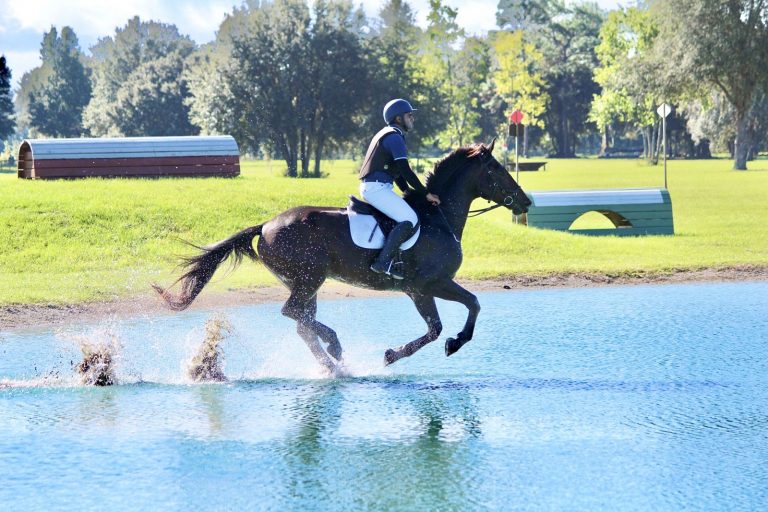 Photo courtesy Muhammad Shahroze Rehman.
Photo courtesy Muhammad Shahroze Rehman.
My life changed after that moment. I started using my break times to hang out with the horses, grooming them, and talking to them for hours. I would indulge myself in some wild imaginations where I was a horse whisperer who lived with hundreds of horses and they all loved me and talked to me. These imaginations were short-lived, as I would hear the bell ring my imaginations would shatter, and I will have to walk back to my dorm. But I didn’t mind repeating the entire process every single day of my life.
The equestrian team at my school is one of the most competitive team and it became a dream of mine to join the team. On my journey to make it on the team I worked with a lot of horses ranging from Arabians to Warmbloods and Thoroughbreds. There were some good days and some bad. Once a horse bucked me off and my foot got stuck in the stirrup, he kept dragging me for a couple of yards before I got my foot out. After being on a hospital bed for a couple of days I went right back on to ride with him. I was finally able to make it on the team in my last year at school. In Pakistan, I have competed in sports like Tent Pegging, Sword Pegging, and freestyle Polo.
When I came to the U.S. in 2018 to pursue my graduate studies, I was excited to find out that the University of Florida has an equestrian club. In Pakistan, equestrian sports are male dominant but I didn’t know that it is a little opposite in the U.S. I joined the club at UF and decided to join the eventing team as it sounded the most exciting. When I first went to attend the club meeting, the room was filled with more than a hundred girls. I became nervous, walked down the room at took a seat in the farthest corner. My anxiety and nervousness went away when my team captain approached me and said, “Hey Muhammad, why don’t you come to sit with the eventing team.” It was a nice gesture, it made me feel welcomed and a part of the team.
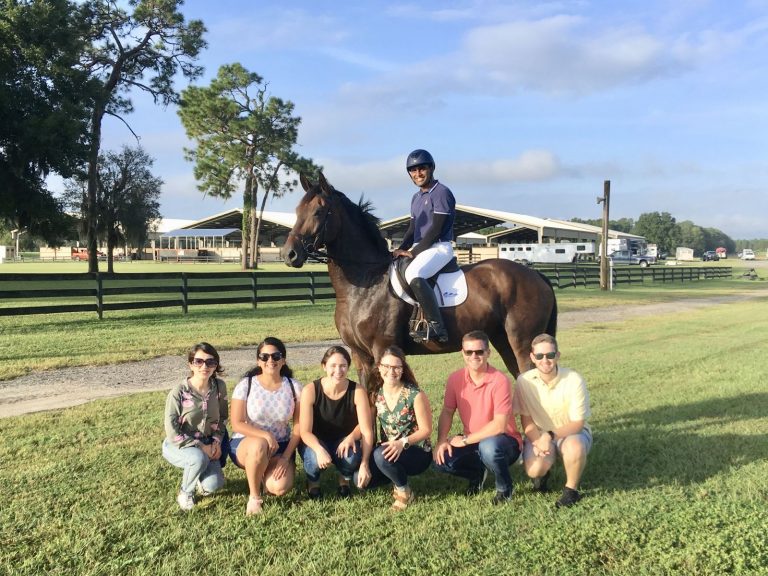 Photo courtesy Muhammad Shahroze Rehman.
Photo courtesy Muhammad Shahroze Rehman.
It’s been two years since I have been on the UF Eventing Team and not a single day I have felt uncomfortable for being an international from a different ethnic and cultural background and the only boy on the team. My teammates are the best people ever. Most of them are very advanced level riders but they have never made me feel like I am a beginner. They always support me, boost my moral at competitions, help me tack up, walk the course with me, guide me, and help me train. I feel blessed to be a part of this team and having some amazing teammates. The past two years were the most excited two years of my life because of this team.
I am currently competing at the Beginner Novice level, but I didn’t know anything about eventing when I started two years ago. I think it would be an injustice if I did not mention the efforts of my awesome coach, Ashley Johnson. She is one of the best riders I have ever known and have had the privileged to train with. She has supported and trained me in my eventing journey, and I aspire to be like her one day.
Eventing is a sport that I am passionate about, it excites me, and I want to learn and grow so that I can compete at advanced levels like my teammates. Just like any other sports, I believe that diversity and inclusion in equestrian sport are very important. The reason why I shared my journey with you is because it is an example of how the positive attitude of my team and coach toward diversity left a long-lasting impact on my life.
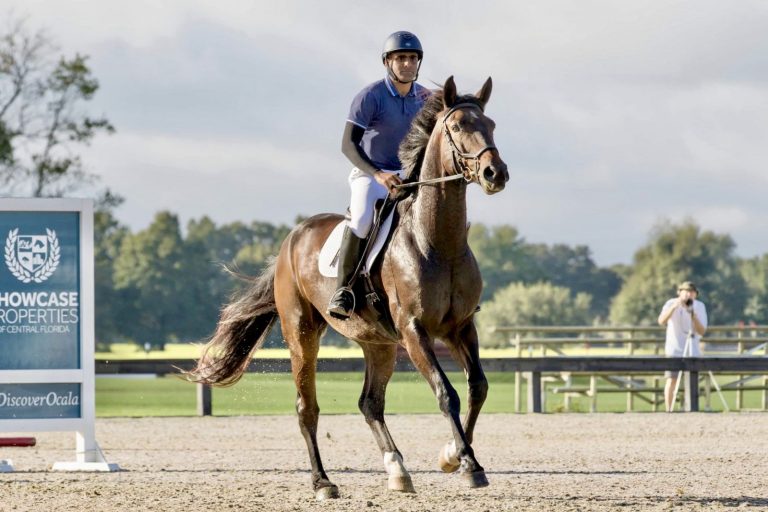 Photo courtesy Muhammad Shahroze Rehman.
Photo courtesy Muhammad Shahroze Rehman.
I believe that diversity and inclusion in equestrian sport provide us not just an opportunity to compete with people from all over the world, but it also gives us a chance to explore and understand people from different nations, cultures, ethnicity, and gender and their perspective of equestrian sports. It also helps us learn what other equestrian sports exist in the world. Through diversity in equestrian sports, we can also learn and create rules and regulations beyond borders that can provide the safety and fair treatment of the horses. It will help us to extend help to horses in need, save them from animal cruelty, and give them a second chance. It is through diversity and inclusion that we can end stereotypes in countries like Pakistan that equestrian sport is only for males.
Horses and equestrian sports have a very special place in my heart. It was through this sport that I got a chance to meet some amazing people and make some lifelong friendships. It was our common interest in the equestrian sport that helped me meet my now fiancé. We have a dream to build a rehabilitation farm for OTTBs and introduce them to second careers. If I receive this scholarship award, I would use this money to adopt my first OTTB and train with him/her for our eventing career.
In the end, I would like to conclude by saying that through diversity and inclusion in the equestrian sport we can learn, grow and empathize with equestrian enthusiasts from all over the world and use it as an asset to improve our sport by making it safer and more exciting for generations to come.
Nation Media wishes to thank Barry and Cyndy Oliff, Katherine Coleman and Hannah Hawkins for their financial support of this Scholarship. We also wish to thank our readers for their support, both of this endeavor and in advance for all the important work still to come.
 Get involved! Muhammad’s essay speaks to the power of equestrian teams for making horses accessible to young people and providing them with a solid horsemanship foundation in a climate and culture that is welcoming and supportive of all. The Intercollegiate Horse Show Association‘s (IHSA) mission statement speaks directly to diversity and inclusion: “The mission of the IHSA is to provide equestrian competition for all college and university students regardless of riding level, gender, race, sexual orientation or financial status. The IHSA is dedicated to promote sportsmanship, horsemanship and academic excellence.” IHSA’s sister organization, the Interscholastic Equestrian Association (IEA), serves grades 4 through 12. IEA now has a nationwide membership of approximately 14,000 students; IHSA encompasses 40 Regions in 8 Zones with over 400 member colleges in 45 states and Canada and represents 10,000 members.
Get involved! Muhammad’s essay speaks to the power of equestrian teams for making horses accessible to young people and providing them with a solid horsemanship foundation in a climate and culture that is welcoming and supportive of all. The Intercollegiate Horse Show Association‘s (IHSA) mission statement speaks directly to diversity and inclusion: “The mission of the IHSA is to provide equestrian competition for all college and university students regardless of riding level, gender, race, sexual orientation or financial status. The IHSA is dedicated to promote sportsmanship, horsemanship and academic excellence.” IHSA’s sister organization, the Interscholastic Equestrian Association (IEA), serves grades 4 through 12. IEA now has a nationwide membership of approximately 14,000 students; IHSA encompasses 40 Regions in 8 Zones with over 400 member colleges in 45 states and Canada and represents 10,000 members.
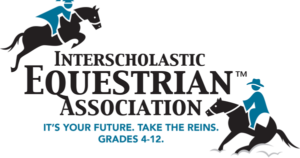 Individual disciplines have programs as well: see the USEA Intercollegiate Eventing Program, which Muhammad’s team participates in, and a new USEA program aimed at middle school and high school eventers will be rolled out in 2021. Here is a list of USEF affiliated Intercollegiate Equestrian Programs.
Individual disciplines have programs as well: see the USEA Intercollegiate Eventing Program, which Muhammad’s team participates in, and a new USEA program aimed at middle school and high school eventers will be rolled out in 2021. Here is a list of USEF affiliated Intercollegiate Equestrian Programs.
Does your school or alma mater have a program? If so, consider joining (and always invite others to come sit at your table — you never know when you might be jump-starting a lifelong love of horses or new riding career path, like Muhammad!) If not, maybe you could get a program going.
If you’re beyond school age, there are other ways to help support these non-profit organizations. Many rely on donations of tack, gear and even horses. Contact programs directly to find out more.
